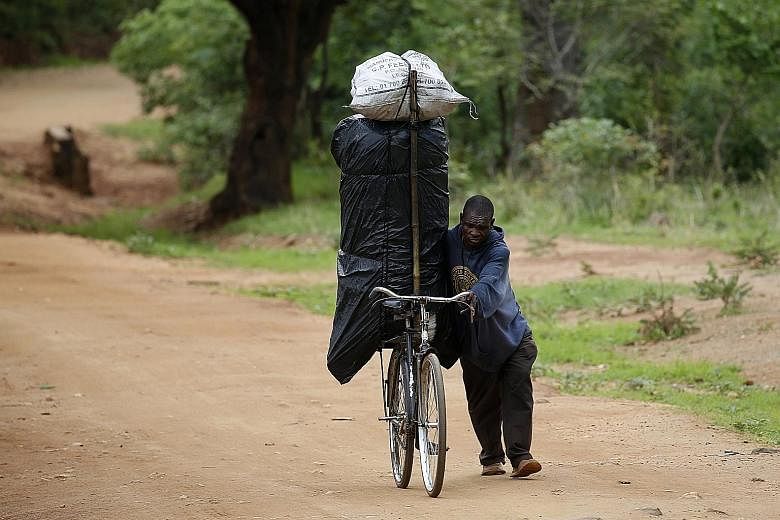I am visiting Ndiamaguene village in the far north-west of Senegal. If I were giving you directions I'd tell you that it's the last stop after the last stop - it's the village after the highway ends, after the paved road ends, after the gravel road ends and after the desert track ends. Turn left at the last baobab tree.
It's worth the trek, though, if you're looking for the headwaters of the immigration flood now flowing from Africa to Europe via Libya. It starts here.
It begins with a trickle of migrants from a thousand villages and towns across West Africa like Ndiamaguene, a five-hour drive from the capital, Dakar. I visited with a team working on the documentary "Years Of Living Dangerously", about the connection between climate change and human migration, which will air later this year on the National Geographic Channel. The day we came, April 14, it was 45 deg C - far above the historical average for the day, a crazy level of extreme weather.
But there is an even bigger abnormality in Ndiamaguene, a farming village of mud-brick homes and thatch-roof huts. The village chief gathered virtually everyone in his community to receive us, and they formed a welcoming circle of women in colourful prints and cheerful boys and girls with incandescent smiles, home from school for lunch. But the second you sit down with them you realise that something is wrong with this picture.
There are almost no young or middle-aged men in this village of 300. They're gone.
It wasn't disease. They've all hit the road. The village's climate-hammered farmlands can no longer sustain them, and with so many kids - 42 per cent of Senegal's population are under 14 years old - there are too many mouths to feed from the declining yields. So the men have scattered to the four winds in search of any job that will pay them enough to live on and send some money back to their wives or parents.
This trend is repeating itself all across West Africa, which is why every month thousands of men try to migrate to Europe by boat, bus, foot or plane. Meanwhile, refugees fleeing wars in Syria, Iraq and Afghanistan are doing the same. Together, these two flows pose a huge challenge for the future of Europe.
Tell these young African men that their odds of getting to Europe are tiny and they will tell you, as one did me, that when you don't have money to buy even an aspirin for your sick mother, you don't calculate the odds. You just go.
"We are mostly farmers, and we depend on farming, but it is not working now," the village chief, Ndiougua Ndiaye, told me in Wolof, through a translator. After a series of on/off droughts in the 1970s and 1980s, the weather patterns stabilised a bit, "until about 10 years ago", the chief added. Then, the weather got really weird.
The rainy season used to always begin in June and run to October. Now the first rains might not start until August, then they stop for a while, leaving fields to dry out, and then they begin again. But they come back as torrential downpours that create floods.
"So whatever you plant, the crops get spoiled," the chief said. "You reap no profits." The chief, who gave his age as 70 but didn't know for sure, could remember one thing for certain: When he was young he could walk out to his fields any time during the planting season "and your feet would sink into" the moist earth.
"The soil was slippery and oily, and it would stick to your legs and feet and you would have to scrape it off." Now, he said, picking up a fistful of hot sand, the soil "is like a powder - it is not living any more". Has he ever heard of something called "climate change"? I asked. "We heard about it on the radio, and we have seen it with our own eyes," he answered. The temperature is different. The winds are different. They're hot when they should be cold.
The chief's impressions are not wrong. Senegal's national weather bureau says that from 1950 to 2015, the average temperature in the country rose 2 deg C, much faster than anticipated, and since 1950, the average annual rainfall has declined by about 50mm. So the men of Ndiamaguene have no choice but to migrate to bigger towns or out of the country.
Which means they are losing the only thing they were rich in: a deep sense of community. Here, you grow up with your family, parents look after children, children then look after parents, and everyone eats and lives together. But now with the land no longer producing enough, "everyone has a (male) family member who has had to leave", said the chief. "When I was young, everyone in the family was together... The mother would be in the house and the man would go to the farm. And everyone stayed with their family, and now it is not what it used to be. I am afraid of losing my community, because my people can't live here any more."
Africa has always had migrants, but this time it is different. There are so many more people and so much less natural capital - Lake Chad has lost 90 per cent of its water - and with cellphones everyone can see a better world in Europe.
Gardens or walls? It's really not a choice. We have to help them fix their gardens because no walls will keep them home.
NEW YORK TIMES

